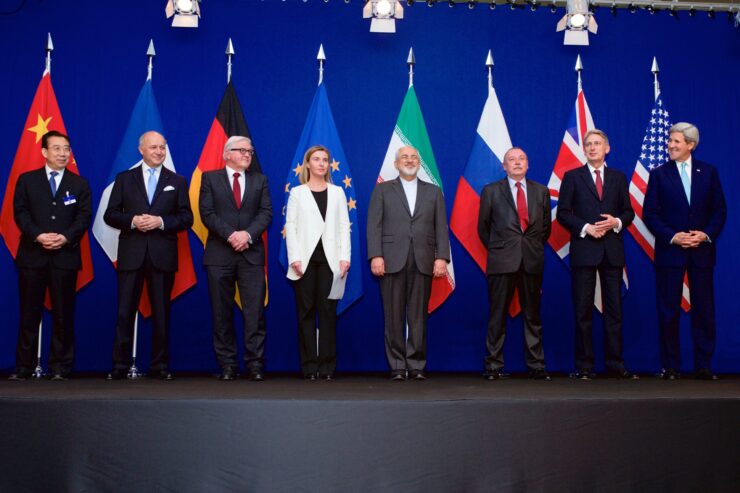
Iran and the West are again at loggerheads – this time over the increasingly ‘provocative’ Iranian demands vis-a-vis the JCPOA (Joint Comprehensive Plan of Action) or the Iranian nuclear accord. The West particularly the US, UK and other members of the western block want Iran to halt its nuclear program. On the other hand Iran perceives its nuclear adventurism as a bargaining tool with which the nation can undo several sanctions imposed by the erstwhile Trump administration which have battered the Iranian economy. However to compound the difficulty of matters further, Israel- Iran’s numero uno foe has made it clear that it is dead opposed to the revival of the deal and is contemplating conducting strikes at Iranian nuclear facilities, should diplomacy fail. On the other hand, Russia and China despite being signatories to the JCPOA are rather unreceptive when it comes to negotiating with Iran and salvaging the nuclear accord signed in 2015.
In these tense times, the only country which can play a key role in defusing tensions is India. Foreign policy mandarins may pour scorn over the role and choice of India as a possible mediator, but it must be noted carefully that it is only India which enjoys excellent ties with all the countries involved in the deal (with the exception of China) and its role may prove to be a game-changer in this context.
Playing Shuttle
Shuttle diplomacy is an excellent means of salvaging the almost dead nuclear accord. India and Iran enjoy deep civilisational and cultural ties. This is enmeshed in the larger context of robust Indo-Iranian ties. India has also deepened its commercial ties with Iran via the strategic Chabahar port of Iran build in 2016 and has become operational earlier this year. While shuttle diplomacy may appear to be a thing of the past, it must be remembered that in the past it yielded rich dividends, for example – US mediation between Egypt and Israel which culminated in the historic Camp David Accord whereby Egypt became the first Arab country to recognize Israel. Another recent example is the recent India-Pakistan ceasefire agreement signed in February 2021. It was later revealed that UAE had played a key role in holding negotiations. Given the rich dividends, India should seriously consider conducting shuttle diplomacy with the signatories of the JCPOA. The Ministry of External Affairs should consider holding several official summits to resolve this crisis. The meetings should be at the levels of the 2+2 format followed by meetings among the heads of the states. New Delhi should be the preferred third party venue for talks. India should also make a strong diplomatic outreach in this context to Israel because only India has the ability to manage a tightrope walk between the Iran and Israel. While this may run counter to the very nature of robust Indo-Israel ties and may even upset the establishment in Israel and its people, yet for the sake of a peaceful Middle East which has been grappling with the problems of terrorism, poverty and economic collapse, India must bite the bullet.
India should especially make the use of its diplomatic capital in improving Israel-Iranian ties, because if both these nation- states improve their ties, it will be a game changer with regard to the fight against terrorism and extremism in Middle East and will open the door for greater cooperation in the region.
Harbinger of new opportunities
If India can successfully manage to pull of this risky scoop then it will have historic implication for peace in India’s extended neighbourhood. Firstly, Iran could potentially consider toning down its rhetoric vis-a-vis its anti-Israel bias. This may even pave the way for Iran to join the historic ‘Abraham Accords’ which was signed last year, this accord allowed Israel to normalize ties with four Arab nations. Secondly, it may lead to an enduring peace in the Islamic world, while this may not be the intended objective of these negotiations yet one may see that the Shia-Sunni schism which characterizes the gulf in the ties of the Sunni gulf kingdoms and Shia Iran may end up becoming increasingly irrelevant as Henry Kissinger put it, “geopolitics triumphs over religious considerations”. This reconciliation will also strengthen India’s standing in the Muslim world. Besides this, deepening of economic ties with the countries involved will prove to be India’s advantage as India will be the chief beneficiary in areas like artificial intelligence, chemicals, green energy, hydrocarbons etc. Thirdly, India could ensure that it will gain a strategic position in the Indo-Pacific region of which the Strait of Hormuz is an integral part. Fourthly, there is also an environmental angle, greater cooperation among the signatories will help tackle the thorny issue of climate change which off late has started plaguing South Asia and more noticeably the Middle East and help save the planet.
Task is not easy
Despite the potential benefits of playing a mediator, there are several pitfalls while India tries to play the role of a mediator. Firstly, India may end up earning itself a bad name among the gulf kingdoms which regard Iran as their arch-rival. Secondly, Israel may become offended with India in trying to bridge the gap between it and its arch rival. Thirdly, China which has been responsible for challenging Indian sovereignty and its vital national interests may try its best to throw the spanner in Indian efforts to heal hearts and minds of the signatories.
Conclusion
History will judge India favourably if it takes this risky plunge. Irrespective of the pitfalls and risks involved, India should embark on acting as the bridge between the signatory countries because it will simply be a game changer for India with regard to its interests in the strategic Middle East.
– The writer is currently working as a Research Associate at Defence Research and Studies (dras.in) and is a columnist. The views expressed are personal and do not necessarily reflect the views of Raksha Anirveda








